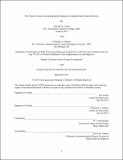The future of lease accounting and its impact on corporate real estate decisions
Author(s)
Canon, Timothy R. (Timothy Robert); Fenbert, Christina A
DownloadFull printable version (1.344Mb)
Other Contributors
Massachusetts Institute of Technology. Center for Real Estate. Program in Real Estate Development.
Advisor
W. Tod McGrath.
Terms of use
Metadata
Show full item recordAbstract
This thesis explores the likely impacts the proposed changes to lease accounting would have on corporate real estate decisions. The Financial Accounting Standards Board (SFASB) and the International Accounting Standards Board (IASB) plan to establish a unified set of principle-based accounting systems into a unified set of principle-based standards in an effort to improve financial transparency and comparability across world markets. One component of this plan, centered on reform of current lease accounting standards, would eliminate the distinction between capital and operating leases and require almost all leases to be recognized as an asset and liability on the balance sheet. This represents a significant departure from the current accounting guidance under Generally Accepted Accounting Principles (GAAP), which requires American companies are only required to disclose only limited information about future operating lease requirements in the footnotes of financial statements. What's more, empirical evidence suggests that many companies structure leases to obtain this type of offbalance- sheet financing that operating leases afford. For companies with relatively large operating lease portfolios, the new accounting standards would have a significant impact on their balance sheets. If these companies consider accounting treatment in their real estate decisions, they may be inclined to pursue alternative real estate strategies to mitigate this impact. That being said, the corporate real estate decision-making process is complex; therefore any strategy aimed at achieving a specific accounting treatment must consider other relevant and potentially more important factors. This study analyzes the proposed changes to lease accounting and explores how corporate real estate managers consider the effects of accounting in their real estate decisions. Specific hypotheses are tested through targeted interviews with a diverse group of public and private tenants and landlords to identify the variables that would determine a particular company's incentive to change its real estate strategy in response to new accounting guidelines. Results of interviews are discussed and predictions are made regarding the future of real estate leasing strategies.
Description
Thesis (S.M. in Real Estate Development)--Massachusetts Institute of Technology, Program in Real Estate Development in Conjunction with the Center for Real Estate, 2011. This electronic version was submitted by the student author. The certified thesis is available in the Institute Archives and Special Collections. Cataloged from student-submitted PDF version of thesis. Includes bibliographical references (p. 91-94).
Date issued
2011Department
Massachusetts Institute of Technology. Center for Real Estate. Program in Real Estate Development.; Massachusetts Institute of Technology. Center for Real EstatePublisher
Massachusetts Institute of Technology
Keywords
Center for Real Estate. Program in Real Estate Development.